“I have nothing new to teach the world. Truth and Non-violence are as old
as
the hills. All I have done is to try experiments in both on as vast a
scale as I could.
(Mahatma Gandhi)
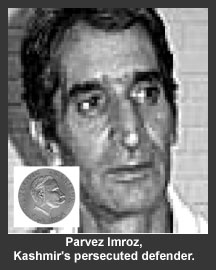 Atty.
Parvez Imroz of the Indian-administered state of Jammu and Kashmir is one
who seems to keep hoping in humanity’s goodness in his search for the
truth through various peaceful means. For many decades now, he has been
concretizing the things he believes in through his continuing work among
victims of human rights violations particularly families of the
disappeared. Sad to say, Atty. Imroz has become the object of various
forms of human rights violations and threats to his life. Despite all
these though, this brave human rights lawyer keeps on with his generous
service to the poor, deprived and oppressed. It is this selfless, untiring
work which makes him a classic example of today’s persecuted human rights
defenders.
Atty.
Parvez Imroz of the Indian-administered state of Jammu and Kashmir is one
who seems to keep hoping in humanity’s goodness in his search for the
truth through various peaceful means. For many decades now, he has been
concretizing the things he believes in through his continuing work among
victims of human rights violations particularly families of the
disappeared. Sad to say, Atty. Imroz has become the object of various
forms of human rights violations and threats to his life. Despite all
these though, this brave human rights lawyer keeps on with his generous
service to the poor, deprived and oppressed. It is this selfless, untiring
work which makes him a classic example of today’s persecuted human rights
defenders.
The projects and activities cited below are only a few
among the countless initiatives of Atty. Imroz and the organizations he
founded or co-founded. Through all these, the good lawyer earned the ire
of the powers-that-be as seen in the threats to his life aimed at
silencing him and the government’s continuing efforts to curtail his
movements.
A Glimpse on Atty. Parvez Imroz work
Atty. Parvez Imroz is an internationally-known human rights defender
having been a recipient of the Ludovic-Trarieux International Human Rights
Prize in 2006, a prize from lawyers given to a lawyer. He was also the
representative of the Srinagarbased Association of the Parents of
Disappeared Persons (APDP) during the conceptualization and founding of
AFAD. Since then, APDP has been contributing to the continuous growth of
the Federation.
Atty. Imroz graduated in Science in Srinagar in 1972
and got his LLB at the Law College of Aligarh Muslim University in 1975.
He joined the J & K High Court as a lawyer in 1978. With this work, he
soon came in contact with hundreds of families of the disappeared who were
filing or pursuing habeas corpus petitions for their missing loved ones.
Early on, Atty. Imroz noticed the desperate situation of the families most
of whom were poor. He tried to help them in many ways in his capacity as a
lawyer. It did not take a long time though before he realized that legal
assistance was not enough.
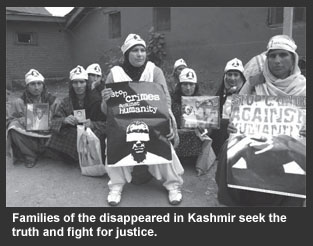 In
1994, Atty. Imroz co-founded the Association of Parents of Disappeared
Persons (APDP) along with families of the disappeared. Since then, APDP
has been engaged in various activities in its efforts to search for truth
and justice. Among the organization’s continuing activities are
documenting cases of enforced disappearance and making this phenomenon
known in the J & K society and beyond, confronting the government and
asking the whereabouts of disappeared people, linking up with other human
rights organizations within India and Asia and in other parts of the
world.
In
1994, Atty. Imroz co-founded the Association of Parents of Disappeared
Persons (APDP) along with families of the disappeared. Since then, APDP
has been engaged in various activities in its efforts to search for truth
and justice. Among the organization’s continuing activities are
documenting cases of enforced disappearance and making this phenomenon
known in the J & K society and beyond, confronting the government and
asking the whereabouts of disappeared people, linking up with other human
rights organizations within India and Asia and in other parts of the
world.
In 2000, Atty. Imroz co-founded the J & K Coalition of
Civil Society (JKCCS). He presently serves as the president of this
coalition. The JKCCS builds local alliances among Kashmiri civil society
groups to widen and strengthen the campaign for victims of enforced
disappearance and other human rights violations.
On July 18, 2001, the APDP laid the foundation stone of
a monument in memory of the Kashmiris who disappeared. This was a great
consolation for the families because this is a lasting memorial for their
missing loved ones. In less than eight hours though, the Indian police
destroyed the foundation stone saying that this was laid on a government
land. They even filed a case against three APDP officers including Atty.
Imroz. However, on April 21, 2005, APDP once again laid down on a
different land the foundation stone for the monument of their beloved
desaparecidos.
In 2002, Atty. Imroz founded the Public Commission on
Human Rights (PCHR). This commission documents human rights violations and
disseminates the information. Soon, the group started to come out with a
monthly newsletter titled: The Informative Missive. The PCHR has been
providing free legal assistance to families of the disappeared and other
victims of human rights violations since then.
The APDP organized a hunger strike which is coordinated
with AFAD’s member-organizations and with other organizations abroad in
April 2003. The strike called for the ending of disappearances,
prosecution of cases and for the creation of a commission which will probe
into all enforced disappearance cases. During the strike, APDP received
letters of solidarity from civil society groups all over the world. In a
continuing manner, the organization staged a protest in Srinagar in 2004.
The police responded brutally and more than a dozen people including Atty.
Imroz were injured, arrested and detained for seven hours.
One of the more recent breakthroughs of the APDP
through the leadership of Atty. Imroz was when, after a painstaking, long
search, the organization discovered close to a thousand graves and mass
graves at the Uri area. This is near the Line of Control (LOC) between the
Indian-Although closely monitored by Indian security forces, the APDP
fact-finding team was able to meet people from the villages who bravely
gave their testimonies pointing to the fact that most of those who were
buried in the graves were young Kashmiris. APDP produced a report titled:
Facts Under Ground: A Fact-finding Mission on Nameless Graves and Mass
Graves in Uri Area which came out in print on 29 March 2008. Needless to
say, the report shocked the world.
Another giant leap was the launching on 5 April 2008 in
Srinagar of the “International People’s Tribunal on Human Rights and
Justice in Indian-Administered Kashmir” briefly called the People’s
Tribunal. This came to reality through the efforts of the PCHR, a
constituent of JKCCS. Convened by human right activists and lawyers
including Atty. Imroz, the People’s Tribunal probes into human rights
violations especially enforced disappearances and seeks international
intervention for the resolution of the Jammu & Kashmir issue. For
2008-2009, it focuses on investigating the unmarked graves cited above. As
regards the People’s Tribunal, Atty. Imroz cited:
“The Tribunal will inquire into the military presence
and governance in Kashmir and their impact on civil society, political
economy, development, local government, media and judiciary. It will
involve the participation of families and survivors seeking justice, local
communities and groups, experts from Kashmir and India, other places in
South Asia and the international community. It will invite renowned
personalities to constitute a council of justice to deliberate on the
Tribunal’s findings. The findings and recommendations will be presented at
a public hearing in Kashmir and subsequently, to the international
community to seek their intervention.”
The Persecuted Human Rights Defender
What makes a person fearless in defending human rights
despite persecution? What makes someone go on with what he/she believes in
despite clear threats to one’s precious life?
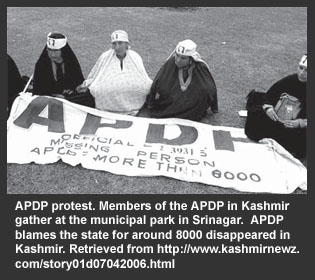 Atty.
Imroz and some of his lawyer-friends have been receiving threats to their
lives since many years ago. In the early 1990s, one of his senior
partners, H N Wanchoo, was killed. On 8 March 1996, Atty. Imroz had tea
with Jalil Andrabi, another High Court lawyer specializing in human
rights. Thirty minutes later, Andrabi and his wife were stopped by a unit
of the 35 Rashtriya Rifles, an Indian paramilitary force. Meanwhile, in
2004, a gunman came to the house of senior lawyer Peer Hussam-ud-Din
Banday requesting to discuss a legal case. But as soon as the gunman was
made to enter the house, he killed the lawyer. Yet, despite what happened
to some of his colleagues, Atty. Imroz fearlessly went on with his human
rights work.
Atty.
Imroz and some of his lawyer-friends have been receiving threats to their
lives since many years ago. In the early 1990s, one of his senior
partners, H N Wanchoo, was killed. On 8 March 1996, Atty. Imroz had tea
with Jalil Andrabi, another High Court lawyer specializing in human
rights. Thirty minutes later, Andrabi and his wife were stopped by a unit
of the 35 Rashtriya Rifles, an Indian paramilitary force. Meanwhile, in
2004, a gunman came to the house of senior lawyer Peer Hussam-ud-Din
Banday requesting to discuss a legal case. But as soon as the gunman was
made to enter the house, he killed the lawyer. Yet, despite what happened
to some of his colleagues, Atty. Imroz fearlessly went on with his human
rights work.
Atty. Imroz, himself, was shot while he was driving
home after visiting a friend on April 12, 1995. Two men armed with
automatic weapons signaled him to stop but he sped up. As he passed the
armed men, he was hit at the upper left of his back. He lost control of
the car near a mosque and someone came to drive him to a nearby hospital.
Fragments of AK-56 bullets were found in his upper back and his left lung
was damaged. After six days, he was transferred to a hospital in Delhi
where he was treated for 15 days. When he returned to Srinagar, several
militants of Hez-bul this was a case of mistaken identity.
On April 30, 2005 at 5:30 AM, just a few days after
APDP had once again laid the foundation stone for the disappeared, an
unidentified gunman came to Imroz’s house in the Kralpora area, stating
that he wanted to discuss a case with him. Civilians were not allowed to
move around at this time of the day in the Kashmir valley. When he was not
allowed to get in, the man banged the door and left after fifteen minutes.
To this day, the government does not allow Atty. Imroz
to travel outside of India. He cited that he applied for the renewal of
his passport in 2004 to the passport authorities in the J & K state. Since
then, the authorities never gave reasons why they were denying him his
passport. The denial of his travel documents deprives him of the right to
have access with regional and international NGOs and human rights
organizations. This is another clear violation of the UN Declaration on
Human Rights Defenders.
Again on June 30, 2008, Atty. Imroz, was harassed in
his house. Allegedly, nine or ten men wearing uniforms of the state police
and the paramilitary Central Reserve Police Force appeared at his house in
Kralpura village (approximately 8 kilometers from Srinagar) and demanded
that Atty. Imroz come outside. Having gone through previous assassination
attempts, Imroz told his wife, Rokhsana, not to open the door. Instead, he
called his brother, Sheik Mustaq Ahmad, who lives nearby. Mr. Ahmad came
out with a torch and asked the group to identify themselves but they
refused. When his nephew went out, one of the uniformed men fired at his
direction but no one was hit. Another man threw a grenade outside his
front door. This exploded but no one was hurt. The men left at around
10:30 P.M. after using tear gas and firing two blank shots outside Imroz’
front door. The perpetrators beat a neighbor they met along the way.
Community members from the village mosque gathered near Imroz’s house. The
villagers “stated that they had seen one large armored vehicle, two Gypsy
cars and men in CRPF (Central Reserve Police Force) uniform and SOG
(Special Operations Group) uniform.”
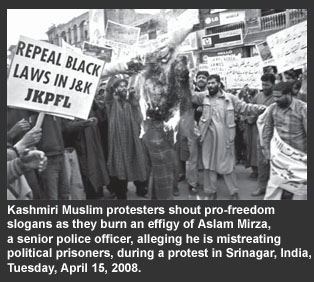 Very
recently, the JKCCS reported that Atty. Imroz and his two associates,
Firdous Ahmed Sofi and Ajaz Ahmed Mir, were arrested at 12:30 noon on
Monday, 17 November 2008. It was stated in the same report, that Atty.
Imroz along with a team of around 50 volunteers composed of journalists,
human rights activists, trade union activists from within and outside
Kashmir, were monitoring the first phase of the Jammu and Kashmir State
Legislative Assembly Election. Accordingly, Atty. Imroz and his two
companions were arrested when they reached the place where a protest
demonstration was going on. The three were allegedly beaten up by the
police in front of media men and were later taken to the Police Station in
Bandipora. With the statements of solidarity and support coming from
different parts of the world, they were released at 10:15 PM of the same
day. After the release, the three had to go through medical check up
because of the beating allegedly done to them by the police.
Very
recently, the JKCCS reported that Atty. Imroz and his two associates,
Firdous Ahmed Sofi and Ajaz Ahmed Mir, were arrested at 12:30 noon on
Monday, 17 November 2008. It was stated in the same report, that Atty.
Imroz along with a team of around 50 volunteers composed of journalists,
human rights activists, trade union activists from within and outside
Kashmir, were monitoring the first phase of the Jammu and Kashmir State
Legislative Assembly Election. Accordingly, Atty. Imroz and his two
companions were arrested when they reached the place where a protest
demonstration was going on. The three were allegedly beaten up by the
police in front of media men and were later taken to the Police Station in
Bandipora. With the statements of solidarity and support coming from
different parts of the world, they were released at 10:15 PM of the same
day. After the release, the three had to go through medical check up
because of the beating allegedly done to them by the police.
As cited earlier, Atty. Imroz is an internationally
known human rights defender. Whenever attempts to his life are done, the
regional and international community comes up with an uproar demanding
justice from the Indian government. To this day though, Atty. Imroz
remains to be persecuted. His persecution is among the government’s
efforts to silence human rights defenders, the families of the disappeared
and other victims in their courageous fight for justice. In the main, the
persecution of human rights defenders like Atty. Imroz and the continuing
phenomenon of enforced disappearance in Jammu and Kashmir is a clear
contradiction to India’s self-proclamation as the “biggest democracy in
the world.”
When will Human Rights Defenders be Safe and Free?
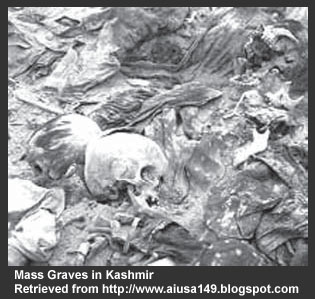 When
will human rights defenders be safe and free to move around and perform
their noble tasks in the interest of society?
When
will human rights defenders be safe and free to move around and perform
their noble tasks in the interest of society?
The continuing harassment of Atty. Imroz raises global
concern and prompts human rights organizations from different parts of the
world to come up with their statements of solidarity. Many of these are
published in leading local, regional and international dailies, aired in
the broadcast media and circulated in the internet. Among the calls to the
Indian government, in the most recent detention and beating on 17 November
2008 of Atty. Imroz and his two companions are as follows:
• To investigate the incident of the beating, arrest
and detention of Parvez Imroz and his colleagues and to punish the
violators of human rights;
• To ensure that those who are responsible for the
arrest, beating and detention of the three human rights defenders be
urgently brought to justice;
• For India to be true to its being a signatory to the
UN Convention for the Protection of All Persons from Enforced
Disappearance which provides for the right of families of the disappeared
to organize themselves. In this regard, the government should give Parvez
Imroz and his colleagues in the APDP their freedom to strengthen their
association so they can keep on with their work for truth, justice and
redress and for the disappeared and other victims of human rights
violations to be enshrined in society’s memory.
In responding to the urgent calls above, somehow India
starts to prove that it is true to its self-proclamation as “a bastion of
democracy in the world.” To this writing though, the world is still
waiting for India’s positive response and much-needed move.